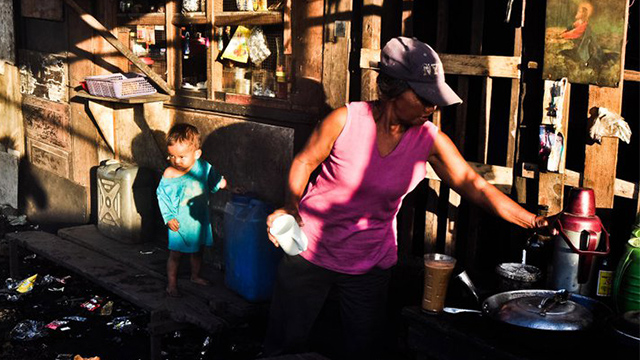SUMMARY
This is AI generated summarization, which may have errors. For context, always refer to the full article.
 “Kung walang corrupt, walang mahirap.”
“Kung walang corrupt, walang mahirap.”
It is a simple, 5-word slogan which renewed people’s hopes for reforms in governance and catapulted PNoy to the presidency in 2010. Today the slogan continues to encapsulate the government’s campaign against corruption.
But when examined deeper, what does the slogan really say? More importantly, is it true? Does the data actually support it?
This is a particularly important question to ask, especially now that the Aquino administration is beginning to wind down and enter its “legacy mode.” And with so much of the administration’s work anchored on its good governance slogan, it will be interesting to see how well the slogan has delivered on its promises more than halfway through the present administration’s term.
Reality check
If an end to corruption means an end to poverty, we may ask: Has corruption ended? And so has poverty?
Regarding the first part, the knee-jerk reaction by many could be a resounding “no.” Objectively speaking, however, there’s no way of meaningfully measuring corruption per se, owing in large part to the illicit nature of corruption. Thus, people often resort to measuring perceptions of corruption instead.
In this regard, the results are mixed. In the international scene, perceptions of corruption seem to have abated: According to the Corruption Perceptions Index (which ranks countries based on how corrupt their public sector is perceived to be), the country’s ranking has jumped from 134 in 2010 to 94 in 2013, or a total of 40 notches in 3 years! In the local scene, however, perceptions of corruption seem to have actually worsened, especially in light of the pork barrel scandal last year.
As for the second half of the slogan: Has poverty ended? On this score, the answer is a categorical “no.” Official data indicate that the share of poor families has hardly changed from 2006 to 2012. In fact the number of poor families has risen over the same period!
Cause and effect
So both the slogan’s antecedent and consequent are false once contrasted with reality. Does this automatically mean that the battle cry of the present administration has failed to deliver? What gives?
At this point it may be useful to step back and dig deeper at the relationship between corruption and poverty.
First of all, it cannot be denied that there is a close link between corruption and poverty across countries. Some of the most corrupt countries like Zimbabwe, Burundi, and Haiti indeed have relatively more poor people. On the other extreme, the least corrupt countries like Denmark, Finland, and New Zealand also have relatively fewer poor people.
But note that correlation says nothing about causation: Just because corruption and poverty move together, such relationship says nothing about which causes which.
Two-way street

Ideally, the way to know whether corruption does cause poverty is to prepare two virtually identical societies and introduce corruption in one but not in the other. After some time, poverty levels between the two societies are then compared. However, social scientists are not gods who could perfectly experiment on people (let alone entire societies) at will.
Despite this obvious limitation, social scientists are not entirely clueless about how society works, either. And with regard to corruption and poverty, they have found (using various statistical techniques) that not only are they related, but they also somehow cause one another in the following manner: corruption causes poverty, but at the same time poverty causes corruption.
While it is intuitive to think of how corruption can cause poverty, how can poverty be also a cause of corruption? For one thing, corruption can thrive where people are very poor and preoccupied with attending to their daily needs and survival, and hence have no time to engage in their communities and make their leaders accountable for their actions. Also, massive resources in aid and relief (in response to disasters leading to poverty) can also spawn misallocation of resources especially when directed to the hands of corrupt public officials.
Regardless of the specific mechanisms involved, the data show that it may, in fact, be misleading to think of the corruption-poverty nexus as a one-way street (as the slogan posits). Instead, corruption and poverty actually form a two-way street, feeding into each other. Corruption begets poverty, but poverty also begets corruption.
So in a way, the slogan is but a half-truth: In reality, corruption is not just a cause of poverty, but also a consequence of it.
People vs. incentives
Another possible reason for the slogan’s apparent failure to hold up against reality is the possible misreading of the “kung walang corrupt” antecedent. Does “corrupt” here refer to corrupt officials or to the incentives and motivations leading to corruption?
The past few years seem to indicate that much focus has been given on going after corrupt individuals. For instance, in the early days of the Aquino administration many of the country’s woes were associated with the failings of the Arroyo administration, and much effort has gone into replacing many of President Arroyo’s remaining allies and appointees in government who were perceived to be just as corrupt.
However, a basic tenet of economics is that people respond to incentives. Thus, there is a difference between rooting out people and rooting out the incentives leading to corruption. Without correcting the relevant incentive mechanisms (most notably the pork barrel system or its transformations), the old corrupt will only be replaced by the new corrupt. This, in turn, will only add to the slogan’s seeming inability to live up to its promise of reform.
Vicious cycle
Grand acts of corruption naturally inspire anger, hatred, and a whole host of other negative emotions among people. That is why after strings of scandals during the Arroyo administration, there was an understandable clamor for anti-corruption and good governance. This is evidenced by the popularity of the “Kung walang corrupt, walang mahirap” slogan to this day.
However, it is so easy to get lost in rhetoric and ideology where emotions run high, that all the while we seem to have focused so much on corruption per se, and not so much on its causes.
And there may well be a vicious cycle between corruption and poverty: Both actually feed into each other. Hence, a holistic and long-term approach to corruption would be better effected by acknowledging the complexity and entirety of the social canvass in which corruption is just part and parcel.
To be sure, good governance will remain to be a crucial component of any antipoverty campaign. But fighting corruption by fighting corruption alone will be as futile as severing the heads of the mythical 9-headed Hydra.
That is, unless the roots of corruption (such as inequality and poverty itself) are addressed in parallel, the Hydra of corruption will only grow stronger and rear more and more of its ugly heads. – Rappler.com
JC Punongbayan holds a master’s degree in economics from the UP School of Economics, where he also graduated summa cum laude in 2009 and currently teaches part-time. His views are independent of the views of his affiliations.
Add a comment
How does this make you feel?
There are no comments yet. Add your comment to start the conversation.